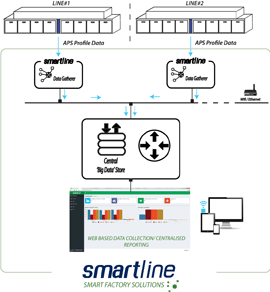With the concept of Industry 4.0 becoming more widespread in manufacturing, SolderStar, a world leading specialist manufacturer in the design and development of thermal profiling equipment for the electronics industry, exhibited their latest development, an innovative data capture system – SMARTLine at SMTA International 2016 in Illinois.
 Since its launch less than a year ago, several companies have already implemented the system into their facilities to enable ‘big data’ capture from reflow ovens for Industry 4.0 projects and trials. SMTA International is bringing the innovative solution to the American marketplace and has received widespread interest from the show.
Since its launch less than a year ago, several companies have already implemented the system into their facilities to enable ‘big data’ capture from reflow ovens for Industry 4.0 projects and trials. SMTA International is bringing the innovative solution to the American marketplace and has received widespread interest from the show.
As the future of manufacturing focuses on the ‘SMART factory’ concept to encourage progressive productivity, profitability and flexibility, the new SMARTLine system is providing a simple and effective solution to monitor data from reflow ovens making condition monitoring and fault diagnosis easily detected. The longer term goal of self-predicting algorithms can also be used to foresee problems before they occur. This provides a company with the ability to understand and have more of an insight into its manufacturing status.
Mark Stansfield, managing director at SolderStar said: “SMTA has shown us that the SMART factory theory is being increasing considered in the US. We met with many companies who were impressed by SMARTLine and its ability to find true intelligent manufacturing procedures.
“SMARTLine provides the network link and software for the streaming of live process data from the ovens on the production floor. The system is scalable and provides all the tools today to allow big data capture from single test/evaluations lines to full smart factories scenarios. It is this innovation that really captured the attention of visitors to SMTA.”
SolderStar SMARTLine communicates via IP networks providing data from the SMT line and provides tools for analysis of the captured data using web based methods via desktop or mobile platforms. These tools provide an immediate insight into the performance of the process, providing engineers with an invaluable insight into the manufacturing environment.
The system architecture uses a layered approach and is built upon existing and widely used protocols. As Industry 4.0 standards develop further it will be a simple step to integrate the data feeds into customer systems with built in support for a number of exchange formats such as XML, JSON and AMQP.






